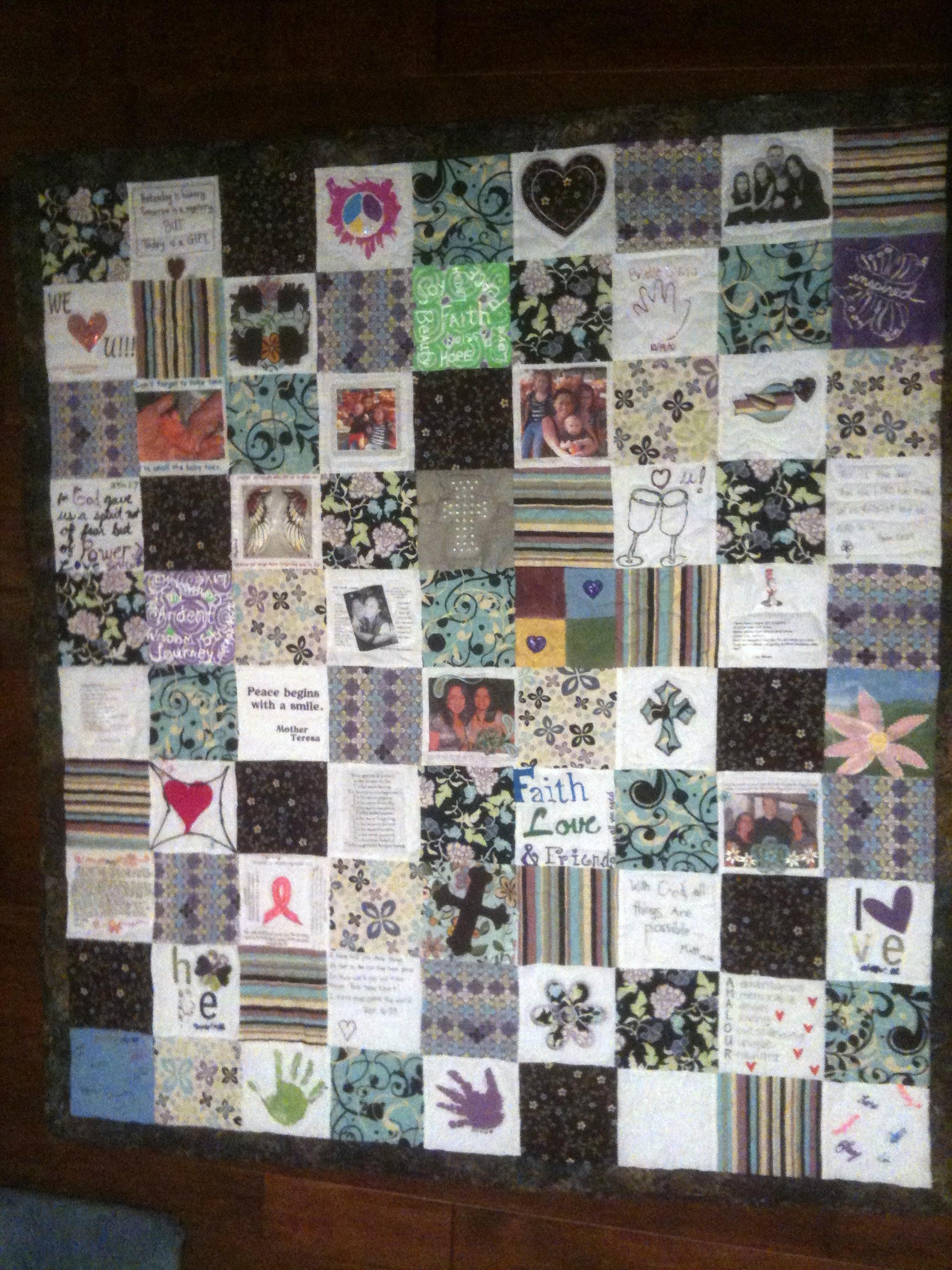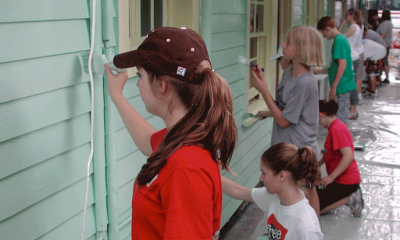Love, Love, Love
I grew up in a house where we said “I love you” a lot. It was a statement of appreciation (“Thanks, Mom! Love you!”), a farewell (“Love you! Bye”), a part of the bedtime routine from childhood through adulthood, (“Goodnight! I love you!”), as well as an expression of sentiment (“Happy Birthday! I love you!”).
I frequently tell my husband, kids, siblings, parents, and friends “I love you!” And I mean it sincerely.
There is a bright shade of lime-green—also known as Julie-green—which I love. I love red wine and dark chocolate. I love cheese. I love my Vita-Mix, my iPhone, and the way my washer and dryer beep me a song when they’re finished a cycle (instead of buzzing). I love Austin.
I recently had the privilege of helping to create a quilt filled with messages of love and support for a dear friend who (after four years in remission and a full mastectomy) is facing a second bout of breast cancer.

A few days ago, my 3 ½ year old got sick in the middle of the night. He came to my bedside and in the saddest, most heartbreaking voice said, “Mommy, I had an accident and it got all over.” Without hesitation I jumped up and consoled him. Within a split second of surveying the scene, I called my husband in to tend to Max while I cleaned up the mess. The whole thing was quite unpleasant, but handled with tremendous love.
With all the different ways we use the word love, it’s a good idea to take a moment to reflect upon what exactly we mean. I am the first to admit my laziness when it comes to distinguishing between like and love. My love of places and things is really about enjoyment. And when it comes to wine, chocolate, technology, and Austin, that enjoyment is pretty intense.
In English, we have one all-inclusive word for love. In Greek, there are four distinct words. I appreciate the insight that C.S. Lewis gives in The Four Loves as he defines and describes each one and their relation to one another.
- Storge – (pronounced with two syllables, and a hard “g” ~ STORE-GAY) A love rooted in a natural fondness or affection. This is often the love we find within families, between parents and children or siblings. The expression “blood is thicker than water” reflects storge love.
- Philia – (the root word in Philadelphia; pronounced PHILLY-AH) true friendship love, involving loyalty, equality, respect, and the bonds of shared interests and activities.
- Eros – (the root word of erotic ~ ERR-OS) refers to a passionate love. This is certainly the intimate love of romance, but it is not necessarily sexual. Eros refers to the passionate love which touches the depths of one’s soul with excitement, energy, and beauty.
- Agape (pronounced both as AH-GAH-PAY and AH-GAH-PEE) is the unconditional giving of oneself—selflessly—for the good of another.
C.S. Lewis wisely points out that as we come to understand the different kinds of love, we shouldn’t feel the need to categorize a relationship or even a given experience as exclusively one of the four kinds of love. There is often quite a bit of overlap.
I find myself quite fortunate to have all four kinds of love for my husband. I have always had a fondness for geeks, so he started off with quite a bit of storge. Our friendship grew as we discovered our mutual appreciation of live music and outdoor fun (in Austin). The mutual respect that followed offered us a great foundation for philia, which we continually cultivate with quality time. Over time, we developed eros, with a passionate and energetic connection that feeds my spirit. And we undoubtedly practice agape with each other, with our children, and with the world around us.
I like that CS Lewis affirms that all love is good; we needn’t rate the four loves as superior and inferior. What we should do, however, is pay attention to the differences. Why? Just as we can get ourselves into trouble when we confuse love with like, things can also go awry when we confuse philia with agape (thinking we have to be friends with everybody).
In faith, we are called to “Love one another as I have loved you” (John 13:34). But Jesus was not calling us to practice eros, storge, or philia. Jesus loves us with agape and calls us to practice agape—unconditional care and concern for the well-being of another—with those we encounter. Agape is the theological virtue of which St. Paul speaks in his First Letter to the Corinthians. Recognizing it as a virtue means that agape is the kind of love we can choose to practice, and become better at practicing.
As you think about who you love, consider also how you love. Which of the four loves do you find abundantly in your life? Which do you find yourself being nudged to cultivate more of and why?
“Heavenly heart © Depositphotos.com/christas”







[…] This complete union involves a total gift of self – mutually given and received in all four senses of love (agape, philia, storge, and eros). […]
[…] Peck, Fromm never actually uses the Greek term, but definitely talks about “Mature Love” in the agapic sense, as a skill that can be taught and […]
[…] that passionate kind of love known as eros is not a feeling. (See my post Love, Love, Love for more explanation on […]
[…] had read my previous post Love, Love, Love, and appreciated the description of the four different kinds of love, but she—like so many of […]
[…] justice, fortitude, and temperance) and three theological virtues (faith, hope, and love). Of these seven virtues, faith seems to be the one people have the most unhelpful preconceived […]
[…] we have received so much more than we gave. THIS is the experience of divine agapic love (see here and here for further explanation on […]
[…] Life) As Christians, we are called to respect human dignity with the care and concern of divine, agape love. This is my commandment: love one another as I love you.(John 15:12) When we put together […]
[…] agape love. That’s how God loves us; that’s how we’re called to love one […]
[…] we have received so much more than we gave. THIS is the experience of divine agapic love (see here and here for further explanation on […]
[…] This complete union involves a total gift of self – mutually given and received in all four senses of love (agape, philia, storge, and eros). […]
I too grew up in a house that said “I love you” a lot. You couldn’t leave for school or go to bed and night without saying it (and meaning it), and that’s how Jim and I are raising our kids.
A few years ago I felt like I was throwing the word “love” around a bit too freely and have since tried really hard to stop saying that “I love” inanimate objects or places and reserve it for the people in my life. I do use the word “lovely” a lot in reference to those “things” that I do enjoy. The four levels make a lot of sense and I’m going to really think about what level(s) may need a bit of a boost in my life. Thank you, Julie!
1) I think this is the best post ever and 2) it could not be more true – we said “I love you” all the time. Like I’ve told others, we said it when we were leaving the room to get a something to eat, we said it when we lost our track of thought; we said it all the time. I couldn’t be happier that we grew up with such affirmation and a level of comfort.
I always found the different types of love so interesting. Who knew there were so many levels. It’s amazing and a true miracle when you experience all of them for one person.
Great post Julie. I love it!
I love this post also. I enjoy comprehending the 4 different levels. In reflection I will ponder what ‘love’ does Mary or Anna fall into. I llok forward to your next mommolie.
Love,
YFM